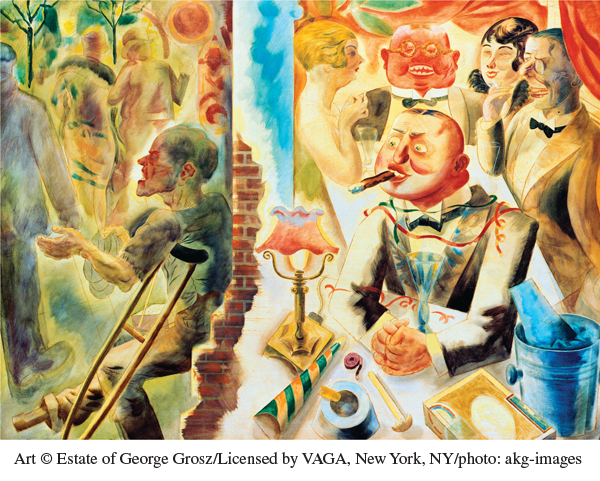A History of Western Society: Printed Page 866
A History of Western Society, Value Edition: Printed Page 832
A History of Western Society, Concise Edition: Printed Page 867
Introduction for Chapter 26
26
The Age of Anxiety
1880–1940
When Allied diplomats met in Paris in early 1919 with their optimistic plans for building a lasting peace, many people looked forward to happier times. After the terrible trauma of total war, they hoped that life would return to normal and would make sense in the familiar prewar terms of peace, progress, and prosperity. Their hopes were in vain. World War I and the Russian Revolution had mangled too many things beyond repair. Great numbers of people felt themselves increasingly adrift in an age of anxiety and continual change.
Late-
Even as modern science, art, and culture challenged received wisdom of all kinds, international relations spiraled into crisis. Despite some progress in the mid-

CHAPTER PREVIEW
How did intellectual developments reflect the general crisis in Western thought?
How did modernism revolutionize Western culture?
How did consumer society change everyday life?
What obstacles to lasting peace did European leaders face?
What were the causes and consequences of the Great Depression?
Chronology
| 1887 | Nietzsche publishes On the Genealogy of Morals |
| 1900 | Freud publishes The Interpretation of Dreams |
| 1913 | Stravinsky’s The Rite of Spring premieres in Paris |
| 1919 | Treaty of Versailles; Freudian psychology gains popularity; Keynes publishes The Economic Consequences of the Peace; Rutherford splits the atom; Bauhaus school founded |
| 1920s | Existentialism, Dadaism, and Surrealism gain prominence |
| 1922 | Eliot publishes The Waste Land; Joyce publishes Ulysses; Woolf publishes Jacob’s Room; Wittgenstein writes on logical positivism |
| 1922 | First radio broadcast by British Broadcasting Company (BBC) |
| 1923 | French and Belgian armies occupy the Ruhr; Corbusier publishes Towards a New Architecture |
| 1924 | Dawes Plan |
| 1925 | Berg’s opera Wozzeckfirst performed; Kafka publishes The Trial |
| 1926 | Germany joins the League of Nations |
| 1927 | Heisenberg formulates the “uncertainty principle” |
| 1928 | Kellogg- |
| 1929 | Faulkner publishes The Sound and the Fury |
| 1929–1939 | Great Depression |
| 1932 | Franklin Roosevelt announces “New Deal for the forgotten man” |
| 1933 | The National Socialist Party takes power in Germany |
| 1935 | Release of Riefenstahl’s documentary film Triumph of the Will |
| 1936 | Formation of Popular Front in France |